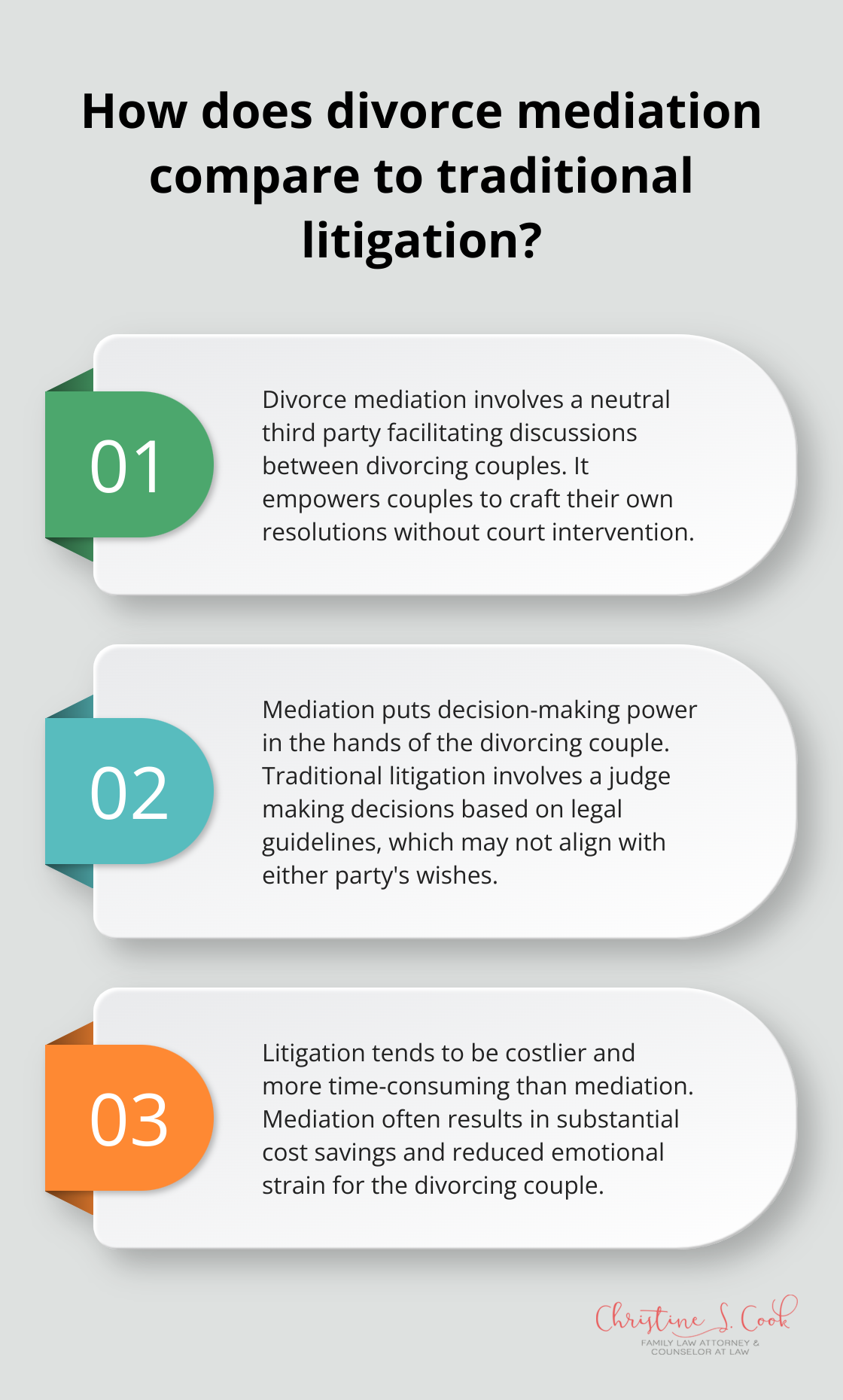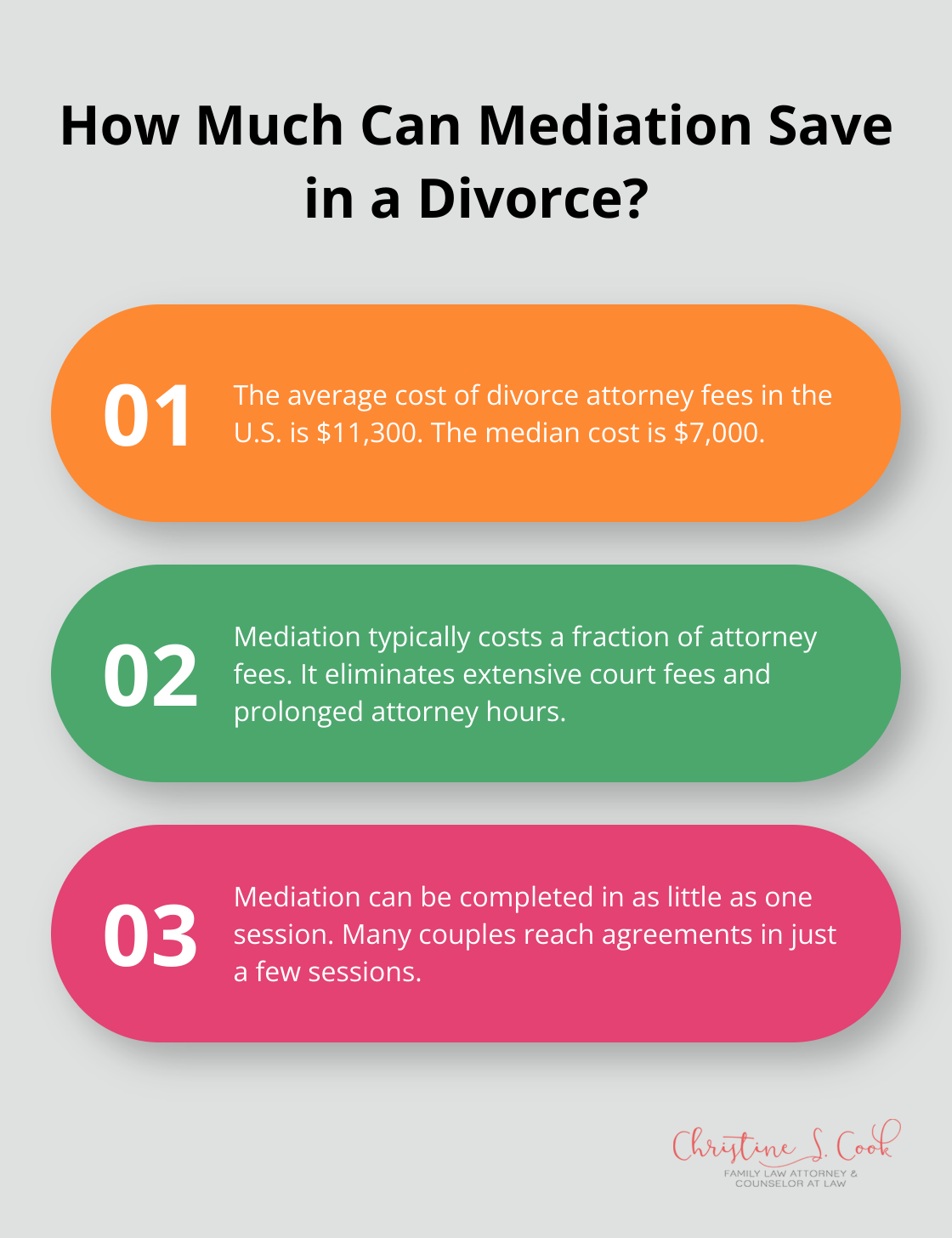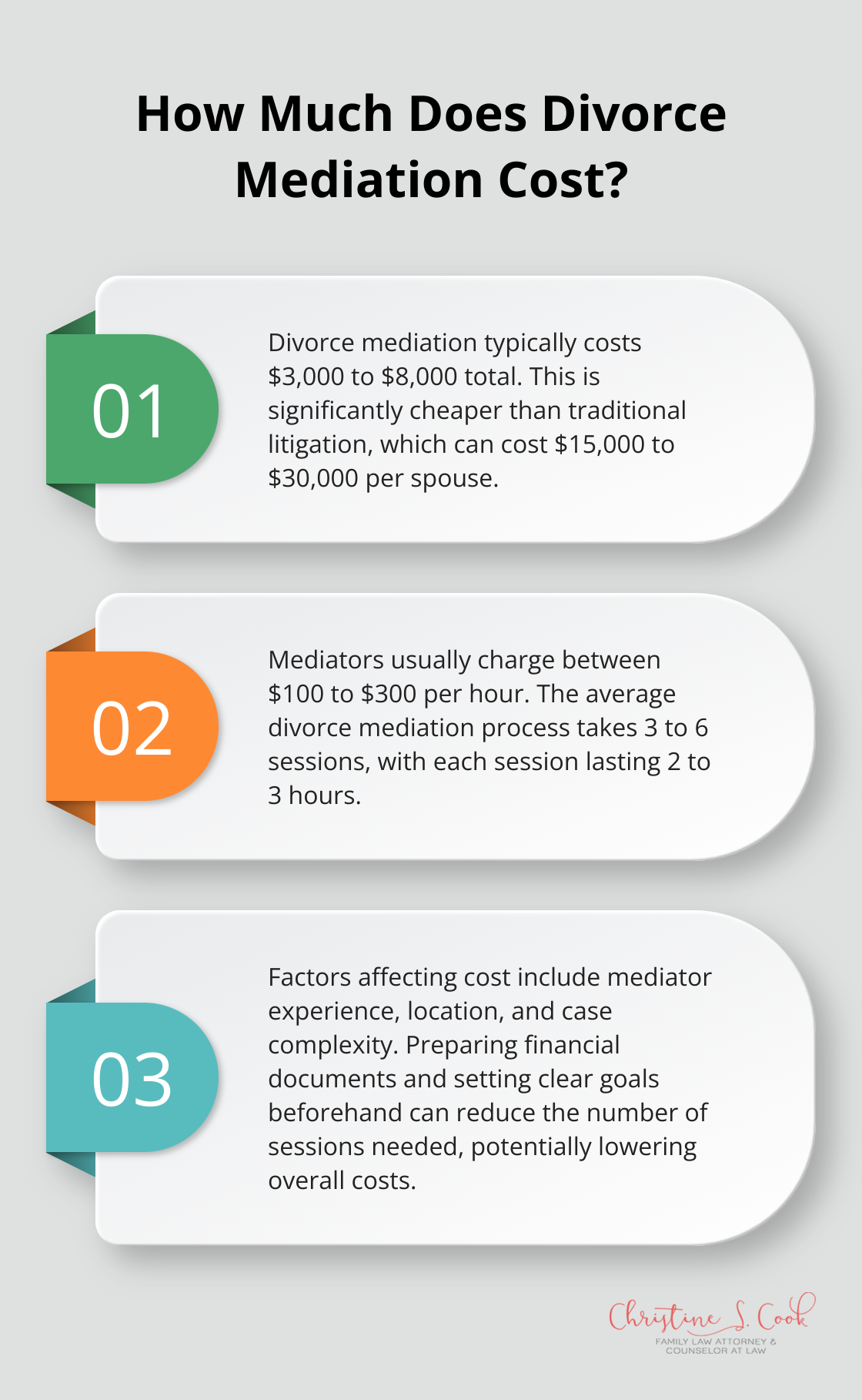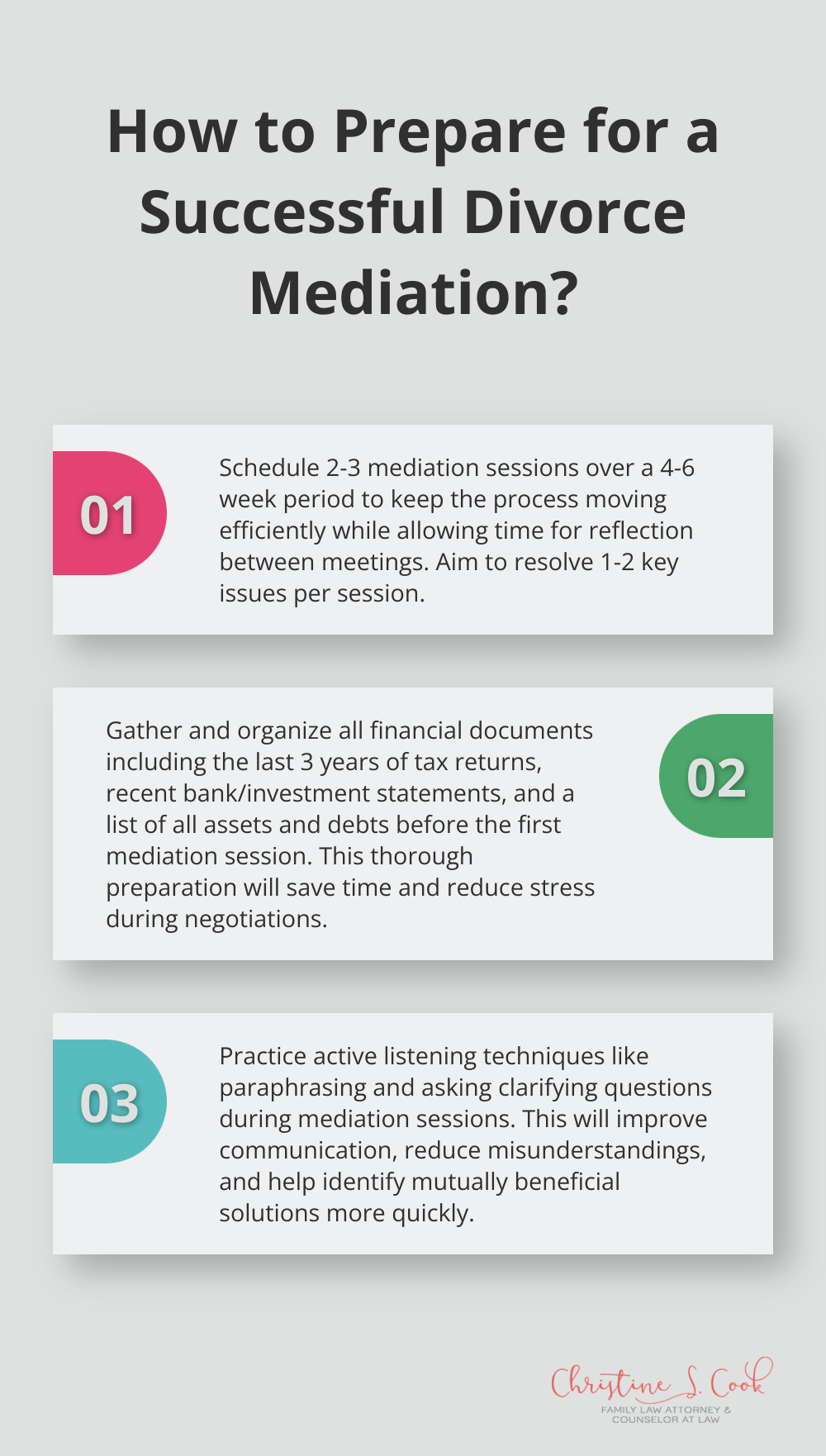Divorce can be a challenging process, but it doesn’t have to be a battle. At Christine Sue Cook, LLC, we’ve seen firsthand how divorce with mediation can transform a potentially contentious situation into a cooperative one.
This approach offers numerous benefits, from reducing costs to minimizing emotional stress. In this post, we’ll explore why mediation might be the right choice for your divorce proceedings.
Divorce mediation is a collaborative approach where a neutral third party facilitates discussions between divorcing couples. This process helps spouses reach mutually agreeable solutions without the need for court intervention. Mediation empowers couples to craft their own resolutions, tailored to their unique circumstances.
Unlike traditional litigation, mediation puts decision-making power in the hands of the divorcing couple. In court proceedings, a judge makes decisions based on legal guidelines, which may not always align with either party’s wishes. Mediation allows couples to create solutions that work best for their specific situation.
Litigation tends to be costlier than mediation due to court fees, attorney charges, and the extended duration of the process. This significant time difference often leads to substantial cost savings and reduced emotional strain.
A mediator acts as a facilitator, not a decision-maker. They guide discussions, ensure both parties are heard, and help identify areas of agreement. Mediators maintain neutrality and do not offer legal advice. Instead, they provide a structured environment for productive conversations, fostering open communication between spouses.
Mediation often results in more satisfactory outcomes for both parties. Collaborative divorce reduces conflict between parents and fosters a cooperative approach to co-parenting. This can help minimize the emotional impact on children and maintain healthier family relationships post-divorce.

Moreover, mediation allows for creative problem-solving. For example, instead of selling the family home and splitting the proceeds, one party might keep the house in exchange for other assets. This flexibility isn’t always possible in court-mandated settlements.
The mediation process can set the stage for a more amicable post-divorce relationship. By learning to communicate effectively and find mutually beneficial solutions during mediation, couples often develop skills that serve them well in future interactions (especially important for co-parenting situations).
As we move forward, it’s important to understand the specific advantages that mediation offers over traditional divorce proceedings. Let’s explore these benefits in more detail.
Divorce mediation offers a range of practical benefits that can make the process smoother, less costly, and more efficient for both parties involved. Let’s explore the advantages that make mediation an attractive option for couples seeking a divorce.
One of the most significant benefits of mediation is its cost-effectiveness. The average cost of divorce attorney fees in the U.S. is approximately $11,300, with a median of $7,000. In contrast, mediation typically costs a fraction of that amount. This is because you don’t pay for extensive court fees or prolonged attorney hours. Instead, you invest in a process that encourages efficient problem-solving and mutual agreement.
Mediation often results in faster resolutions compared to court proceedings. The mediation process can be as short as one session, or last a few weeks or more. The actual duration of mediation in your case will depend on the number of issues to be resolved and the complexity of your situation. Many couples reach agreements in just a few sessions, allowing them to move forward with their lives more quickly.
In mediation, you and your spouse retain control over the outcome. Unlike in court, where a judge makes decisions based on limited information, mediation allows you to craft solutions that truly work for your unique situation. This can lead to more satisfactory and sustainable agreements, especially when it comes to complex issues like property division or child custody arrangements.
The collaborative nature of mediation can significantly reduce the emotional toll of divorce. A study by the American Psychological Association found that couples who went through mediation reported less anxiety and emotional distress compared to those who went through litigation. This reduced stress can particularly benefit you if you have children, as it sets a positive tone for future co-parenting relationships.
Mediation provides a structured environment for open and honest communication. With the guidance of a skilled mediator, you’ll learn effective ways to express your needs and listen to your spouse’s concerns. These improved communication skills can prove invaluable, not just for finalizing your divorce agreement, but also for navigating future interactions (especially if you’ll be co-parenting).

Choosing mediation means opting for a process that prioritizes collaboration over confrontation. This approach not only benefits you during the divorce proceedings but can also set the stage for a more amicable post-divorce relationship. Now that we’ve explored the benefits of mediation, let’s look at the key elements that contribute to a successful mediation process.
Selecting a qualified mediator is essential for a successful mediation process. Talk with family members, friends, and respected associates who have gone through divorce mediation and have been satisfied with the outcome. Look for a professional with extensive experience in family law and a proven track record of successful mediations. We recommend seeking mediators who are certified by recognized organizations and have a background in both law and psychology. This combination of skills can help navigate complex emotional and legal issues effectively.
Proper preparation is essential for productive mediation sessions. Gather all necessary financial documents, including tax returns, bank statements, and property valuations. Create a comprehensive list of assets and debts to ensure nothing is overlooked. It’s also helpful to outline your priorities and concerns before the first session. This preparation allows you to enter mediation with a clear understanding of your financial situation and goals.
Entering mediation with realistic expectations is vital for a smooth process. Understand that compromise is key in mediation. While you may not achieve everything you want, the goal is to reach a fair agreement that works for both parties. Communicate effectively, focus on solutions, and be prepared to compromise while seeking a balanced and fair agreement. Research typical outcomes for issues like property division and child custody in your state to help set realistic expectations. The aim is to find solutions that benefit everyone involved (especially if children are part of the equation).
Effective communication is the cornerstone of successful mediation. Be prepared to express your needs and concerns clearly and listen actively to your spouse’s perspective. Avoid confrontational language and focus on problem-solving rather than blame. If you struggle with communication, consider working with a therapist or communication coach before or during the mediation process. This can help you develop the skills needed to navigate difficult conversations productively.
When discussing agreements, think beyond the immediate future. Consider how decisions will impact your life and your children’s lives in the years to come. For example, when discussing property division, think about long-term financial stability rather than short-term gains. If you’re addressing child custody, consider how your arrangement will work as your children grow and their needs change (this foresight can reduce the need for future modifications).

Divorce with mediation offers a less contentious, more cost-effective, and often faster path to resolution than traditional litigation. Couples maintain control over their decisions, reduce emotional stress, and establish a foundation for better future communication. This approach particularly benefits those with children, as it fosters a cooperative environment that eases the transition for the entire family.

The benefits of mediation extend beyond the immediate divorce process. Couples learn effective communication, problem-solving, and compromise skills that serve them well in post-divorce interactions. The financial savings and reduced emotional toll provide a solid foundation for starting the next chapter of life (which can be especially important during this challenging time).
At Christine S. Cook, LLC, we understand the complexities of divorce and the value of mediation. Our experienced team guides clients through the mediation process with compassion and expertise. If you consider divorce and want to explore mediation as an option, we invite you to reach out to Christine S. Cook, LLC for a consultation.
